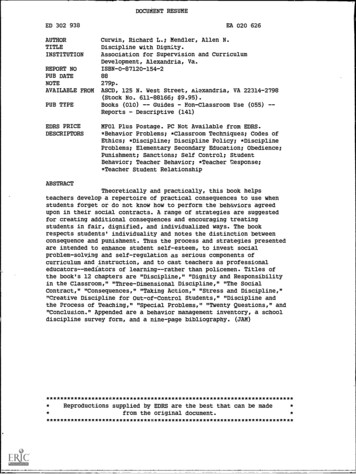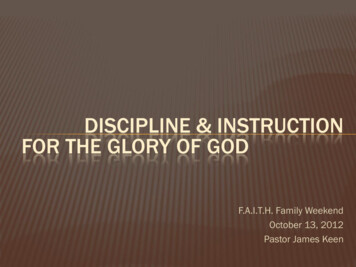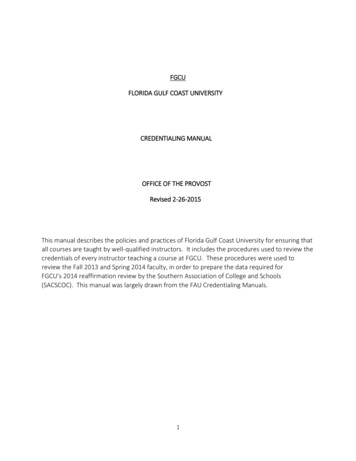
Transcription
i
Child DisciplineCopyright 2010 by David W. CloudThis edition February 2012ISBN 978-1-58318-164-5This book is published for free distribution in eBook format. It isavailable in pdf, mobi (for Kindle, etc.), and epub formats fromthe Way of Life web site. We do not allow distribution of this bookfrom other web sites.Published by Way of Life LiteraturePO Box 610368, Port Huron, MI 48061866-295-4143 (toll free) - fbns@wayoflife.orgwww.wayoflife.orgCanada: Bethel Baptist Church4212 Campbell St. N., London Ont. N6P 1A6519-652-2619Printed in Canada byBethel Baptist Print Ministryii
Table of ContentsIntroduction .1Understanding the Child’s Nature .4Obedience and Respect for Authority .5Making Much of God’s Word .11Discipline Must Begin Early .20Effective Use of the Rod .22No Sassing or Resisting.30Discipline for Actions and for Attitude .32Discipline in Love .34Consistency and Persistency .37Involvement and Communication .39Father and Mother in Harmony .44Keeping the Child’s Heart .45Discipleship .54Teaching A Work Ethic and Responsibility .62Continuing Through Adolescence.64Not Provoking Children to Wrath .70About Way of Life’s eBooks .71Powerful Publications for These Times .72iii
iv
IntroductionThe following is excerpted from the 532-page bookKEEPING THE KIDS: HOW TO KEEP THECHILDREN FROM FALLING PREY TO THE WORLD,which is available in print and eBook editions fromWay of Life Literature. The book is a child-trainingmanual, a marriage manual, a discipleship manual. It isa manual for parents, grandparents, pastors, and youthworkers.Chapter Titles from the book. Can We Keep the Kids? The Necessity of Priority The Necessity of a Biblical Conversion The Home: Consistent Christian Living The Home: The Husband-Wife Relationship Child Discipline The Church Separation from the Pop Culture Discipleship The Grandparents What if the Kids Are Already Rebellious? Candor, God’s Grace, and the Power of Prayer Ten Tips for Daily Bible Reading How to Lose Your Child Before He Is Five A Checklist for “Keeping the Kids”Effective child discipline is one of the most importantaspects of “keeping the kids.” Such discipline must beaccomplished within a framework of a godly homeenvironment, which is why we dealt with this1
(consistent Christian living, husband-wife relationship,etc.) separately in the previous chapters.The Bible says, “Train up a child in the way he shouldgo: and when he is old, he will not depart fromit” (Proverbs 22:6).We discussed this verse at the beginning of the book(Keeping the Kids) in the chapter “Can We Keep theKids?” I believe it is God’s promise for godly childtraining. It does not mean that the child will neverstruggle with submission to God and human authority,nor does it mean that the child will necessarily exhibitperfect sanctification and surrender. It simply meanswhat it says. If the child is trained in the right way hewill not depart from it when he is old, and that agevaries from child to child.Parents need to go to God’s Word for instruction indiscipline, and not to the world or to Christianpsychologists. The Bible is given by divine inspirationand is able to make God’s people “perfect, throughlyfurnished unto all good works” (2 Timothy 3:16-17).This means that the Bible has everything we need forfaith and practice. The word “perfect” does not meansinless perfection; it means thoroughly furnished orequipped to do God’s will in this world. It haseverything necessary for godly husband-wiferelationships and for effective child training.There are Bible-based books that can help parents inthis all-important task of training their children. Itdoesn’t come naturally; it must be learned. ManyChristian parents were not raised in a godly homethemselves, so they have never seen these things livedout. Two books that I recommend are the following:Rearing Spiritual Children to Serve the Savior byTerry Coomer. God has given Pastor Coomer somespecial wisdom about building a godly Christian lifeand family. In addition to publishing helpful materials2
on this subject, he conducts family conferences in localchurches. He may be contacted at For Love of theFamily Ministries, P.O. Box 535, Elwood, IN 46036,765-552-1973, aining Your Children to Turn out Right by DavidSorenson (Northstar Ministries, 218-726-0209,w w w . n o r t h s t a r m i n i s t r i e s . c o m ,dhs.northstar@charter.net)Materials are available, but they must be used. Iwould challenge parents to get these books and sitdown together and go through them and discuss them.Analyze your family in light of God’s Word and decidewhat changes need to be made.Churches need to emphasize this matter and givemore practical instruction than they usually do. It is thechurch’s responsibility to teach God’s Word, and it isGod’s Word that contains the instructions on how totrain godly children. A message on the home and childtraining every year or so is not enough! This themeneeds to be regularly woven into the preaching andteaching. (For more on this see the chapter on TheChurch under the section “A church that seeks to buildstrong families.”)The following are principles of child discipline thatare emphasized in the Scripture.3
Understanding the Child’s Nature“Foolishness is bound in the heart of a child; but therod of correction shall drive it far from him” (Proverbs22:15).A sound child training philosophy begins withunderstanding the child’s nature. According to theBible, he has inherited a sinful nature from Adam thatis naturally bent toward foolishness rather thanwisdom.Modern child psychology begins with the idea thathuman beings are basically good and seeks to developthat inherent goodness and build “self esteem.”The Bible begins with the doctrine that human beingsare fallen by nature and seeks to bring them toconversion and regeneration by the tools of conviction,repentance, and faith through the instrumentality ofthe Law of God and the Gospel of Jesus Christ, and tospiritual growth by tools such as communion,surrender, obedience, and separation.4
Obedience and Respect for AuthorityThe first objective of godly child discipline is to teachthe child obedience and respect for authority so that hewill submit to God. The child must be taught that Godis a holy, law-giving God who must be obeyed and thatdisobedience brings punishment. This prepares thechild to understand God’s character and the reality ofthe moral universe and it instructs him in thefoundational principles of salvation.Since the child cannot see God, he must be taught torespect divine authority through learning to respectparental authority.Bob Nichols, missionary to Brazil, says,“The first thing you need to do is establish yourauthority in the lives of your children. If you neverestablish authority, they’ll never respect you. Too oftenI’ve seen parents asking their children if they want todo this or that. But when they are young, you don’t askthem, you tell them. They need to learn to obeyauthority. Too often parents don’t establish theirauthority in the lives of their children, and that is verytragic. Once you establish that then you have to be sureto give clear commands to your children, that theyunderstand what you are requiring, and if thecommand is given they need to carry it out. If not, thatis direct disobedience.”Pastor Gene Haymaker observes that the highpercentage of young people who leave church is partlythe cause of parents who “refusal to restrain.” He says,“Proverbs teaches us that foolishness is to be drivenfrom our children through correction, but this issomething that I believe is missing in many homes.Boundaries, standards, and even consequences havebeen abandoned in a belief that children inherentlywant to do right. It is sad when parents prefer to betheir children’s friends rather than embracing their5
God-given role of parenting, and when they leave theirchildren to themselves even though the Scripturesteach that a child left to himself brings shame. Therefusal to restrain our children is not love, but ratherevidence that we do not love them as we ought.According to the Scripture, a father who loves his sonchastens him (Heb. 12:6).”Pastor David Sorenson gives the following counsel,The first major, absolute rule that I would suggest foryour family is to demand obedience. Few things infamily life are more fundamental than teachingchildren to obey. We positively, absolutely alwaysexpected our children to obey when they were givenclear instructions (Ephesians 6:1). .If children are consistently disobedient, it means thatthe parents, at some point, have not trained them to beobedient. . We positively demanded that our childrenobey us. If they did not obey, there were immediateand consistent consequences. Every time. Every singletime! Obedience is critically important. Not only isobedience important to maintain order in a child’s life,but it also has a profound spiritual implication. .when children become accustomed todisobeying their parents and getting away withit, they are likely to adopt the same attitudetoward doing God’s will. .Parents, you will do your children a great spiritualfavor by insisting on obedience. You are establishing aprecedent in their lives for them to obey God as theymature and become independent. .Insisting on obedience is a basic way of training a childto subordinate his or her old nature to standards ofright. . In our home, when one of the children wasdirectly and overtly disobedient, it was dealt withimmediately. There were no ifs, ands, or buts. . Therewas no debate. . If one of the children was punishedfor having been disobedient, we always made very surethat she understood her punishment was became shedisobeyed.6
Our children need to learn that every single time theyviolate a household rule, there will be a predictable andunpleasant experience. Children seem to think that ifthey whittle away at their parents long enough, theparents will wear down and then give in. Consistentlyenforce your rules (Training Your Children to Turnout Right, pp. 62-64, 71).Parents must use every opportunity to teachtheir children obedience, and the training anddiscipline must be consistent. If it is inconsistent,off and on, it will not work and, in fact, could do moreharm than good.For example, I have seen many parents tell their childto do something and then back down and do itthemselves when the child refuses. I recall a father whowas watching his son playing outside. When the childtook some bean husks and threw them into a playsandbox, the father told him to get the husks and putthem into a trash bag nearby. The son ignored him. Thefather told him again and again was ignored. The childlooked at him but didn’t move. Finally, the father gotup and did it himself and let the child get away withopen disobedience. The child should have beenspanked the very first time he refused to obey andspanked sufficiently so that he was forced to obey andwas left with a bad taste for disobedience. That processis not as easy as getting up and doing the thing yourselfbut it is godly child training and will bear good fruit intime. Ignoring disobedience, even some of the time,will also bear fruit in time, but it will not be good fruit.Children must be taught to be respectful ofauthority figures other than parents, whethergrandparents, teachers, pastors, police, or even adultsin general. If children do not learn to respect humanauthority, they certainly won’t respect God’s authority.The Lord has ordained a chain of authority in this7
world, and godly morality has a lot to do withsubmission to that authority. Respect to God demandsrespect to the authority that God has ordained (1Corinthians 11:3). Submission to authority is greatlyemphasized in the New Testament epistles.“Let every soul be subject unto the higher powers. Forthere is no power but of God: the powers that be areordained of God” (Romans 13:1).“Submitting yourselves one to another in the fear ofGod. Wives, submit yourselves unto your ownhusbands, as unto the Lord” (Ephesians 5:21-22).“Children, obey your parents in the Lord: for this isright. Honour thy father and mother; (which is the firstcommandment with promise;) That it may be well withthee, and thou mayest live long on theearth” (Ephesians 6:1-3).“And we beseech you, brethren, to know them whichlabour among you, and are over you in the Lord, andadmonish you; And to esteem them very highly in lovefor their work's sake. And be at peace amongyourselves” (1 Thessalonians 5:12-13).“Rebuke not an elder, but intreat him as a father; andthe younger men as brethren; The elder women asmothers; the younger as sisters, with all purity. (1Timothy 5:1-2).“Let the elders that rule well be counted worthy ofdouble honour, especially they who labour in the wordand doctrine” (1 Timothy 5:17).“Put them in mind to be subject to principalities andpowers, to obey magistrates, to be ready to every goodwork” (Titus 3:1).“Obey them that have the rule over you, and submityourselves: for they watch for your souls, as they thatmust give account, that they may do it with joy, andnot with grief: for that is unprofitable foryou” (Hebrews 13:17).8
“Submit yourselves to every ordinance of man for theLord's sake: whether it be to the king, as supreme; Orunto governors, as unto them that are sent by him forthe punishment of evildoers, and for the praise of themthat do well” (1 Peter 2:13-14).“Honour all men. Love the brotherhood. Fear God.Honour the king” (1 Peter 2:17).“Likewise, ye wives, be in subjection to your ownhusbands; that, if any obey not the word, they also maywithout the word be won by the conversation of thewives” (1 Peter 3:1).Children need to be taught to do things thatexhibit respect for authority.They need to be taught to speak respectfully to adults.The “old-fashioned” custom of teaching children tolearn to say “yes sir” and “no sir” to their elders wasdesigned to educate them to respect authority.Missionary Bob Nichols says, “I’ve always insisted onmy kids saying, ‘Yes sir’ and ‘no sir.’ I know that’s notreal popular, but it shows respect and kids need to dothat.” At the very least the children should be taught touse respectful language with adults instead of slang.Children need to be taught to answer adults whenthey are addressed. Many children are shy, it is true,but they also like to play silly games and they must betaught to come out of their comfort zone and showrespect to authority and not be allowed to follow theirnatural tendencies. As I travel on preaching andresearch trips in many parts of the world and havepreached in over 500 churches, I have often asked achild his name or some other question and the childhas refused to answer. Many parents excuse thisbehavior instead of training the child properly.Children need to be taught not to interrupt adultswhen they are talking.9
They need to be taught to greet adults when theycome into their presence, instead of ignoring them andcontinuing with their own business. The latter is an actof disrespect. This is especially true if the adult is anauthority figure, such as a grandparent or a teacher.Younger children even need to be taught to respectthe older children. Missionary Bob Nichols says,“We always taught the younger ones to obey the olderones. A lot of times the younger don’t want to listen tothe older, but God put us in the order in which we areborn into the families with a design and purpose. Sothey have to understand that.”None of these things come “naturally.” Naturally, thechild follows the way of his fallen heart, which isselfish, insubordinate, and disrespectful.Teaching obedience and respect for authority is amajor part of child discipline.10
Making Much of God’s WordIt is the Word of God that has the power to sanctify usand build us up in Christ. It imparts conviction,enlightenment, spiritual strength, faith, wisdom,repentance. Consider the following Scriptures:“This book of the law shall not depart out of thymouth; but thou shalt meditate therein day and night,that thou mayest observe to do according to all that iswritten therein: for then thou shalt make thy wayprosperous, and then thou shalt have goodsuccess” (Joshua 1:8).“Blessed is the man that walketh not in the counsel ofthe ungodly, nor standeth in the way of sinners, norsitteth in the seat of the scornful. But his delight is inthe law of the LORD; and in his law doth he meditateday and night. And he shall be like a tree planted bythe rivers of water, that bringeth forth his fruit in hisseason; his leaf also shall not wither; and whatsoeverhe doeth shall prosper” (Psalms 1:1-3).“Wherewithal shall a young man cleanse his way? bytaking heed thereto according to thy word” (Psalms119:9).“Thy word is a lamp unto my feet, and a light unto mypath” (Psalms 119:105).“And now, brethren, I commend you to God, and to theword of his grace, which is able to build you up, and togive you an inheritance among all them which aresanctified” (Acts 20:32).“So then faith cometh by hearing, and hearing by theword of God” (Romans 10:17).“And that from a child thou hast known the holyscriptures, which are able to make thee wise untosalvation through faith which is in Christ Jesus. Allscripture is given by inspiration of God, and isprofitable for doctrine, for reproof, for correction, forinstruction in righteousness: That the man of God may11
be perfect, throughly furnished unto all good works” (2Timothy 3:15-17).“For the word of God is quick, and powerful, andsharper than any twoedged sword, piercing even to thedividing asunder of soul and spirit, and of the jointsand marrow, and is a discerner of the thoughts andintents of the heart” (Hebrews 4:12)“As newborn babes, desire the sincere milk of theword, that ye may grow thereby” (1 Peter 2:2).“We have also a more sure word of prophecy;whereunto ye do well that ye take heed, as unto a lightthat shineth in a dark place, until the day dawn, andthe day star arise in your hearts” (2 Peter 1:19)Wise Christian parents will fill their homes with theScripture, teaching it to the children, memorizing ittogether, discussing it.David Sorenson writes,If there is a basic truth that is universal in trainingchildren to be godly, it is the necessity of building afoundation of the Word of God in their lives. This istrue for any born-again Christian and that includes thechildren of God’s people. I fear that Christian parentscome to rely on Christian media, Sunday Schoolteachers, church youth programs, and Christianschools to see their youth turn out right. All of theseare potentially good and can be a great help; however,the foundation for godly living is often missing in thelives of the children and youth of God’s people. Thatfoundation is a daily absorption of the Word of God.A young person from a Christian home can go to aChristian school or be home-schooled with a godlycurriculum, be faithful to Sunday School and churchprograms, go to church camp, and be carnal,rebellious, and worldly. Or more frequently, they arejust lukewarm and go with the flow, but there are nottrue spiritual convictions in their hearts. The reason isas simple as it is singular. They are not in the Word ofGod on a daily basis.12
It makes little difference if one is a young person or aseasoned adult. Apart from daily consumption of theWord of God, any believer will be carnal and moreworldly than godly. God said to Joshua, millennia ago,‘This book of the law shall not depart out of thy mouth;but thou shalt meditate therein day and night, thatthou mayest observe to do according to all that iswritten therein: for then thou shalt make thy wayprosperous, and then thou shalt have goodsuccess’ (Joshua 1:8). That premise and promise hasnever been abrogated. When a young person, oranyone for that matter, saturates his mind with theWord of God so that it soaks down into his heart, it willmodify his behavior. It will impact his heart and mind.That is why the Psalmist wrote long ago, ‘Thy wordhave I hid in mine heart, that I might not sin againstthee’ (Psalm 119:11). The idea here is not so much rotememorization of Scripture as it is filling one’s mindwith God’s Word to such a degree that it soaks downinto the heart. When that has happened, we will notsin against God. The will has been changed.As a pastor, I watch children from Christian homeswho are in Christian schools or are home schooled.Their parents make sure they are at every service andyouth function of the church. And yet, these same kidsare rebellious, carnal, and have a worldly attitude.Why? Because they are not in the Word in ameaningful way. It’s as simple as that (Sorenson,“Seven Principles in Training Godly Children”).Missionary Bob Nichols says,“One of the things that we did was concentrate onteaching the children the Word of God and Biblememorization.”A respondent to our questionnaire wrote,“We are a Navy family so we have had the privilege tobe members of several churches. At every one thechildren’s teachers were shocked by my children’sknowledge of the Bible. We home school and the Lordhas inspired me to create a Bible curriculum to give13
regular daily instruction in the Scriptures. The kidslove it!”An effective family altarThe daily family altar is very important. It is a timewhen the family can meet regularly and consistently toworship God and study His Word. It is a time to readthe Bible and discuss it. It is a time to memorizeScripture. It is a time to pray together.Pastor Gene Haymaker says,“The day of family altars is disappearing as quickly asour youth. Families have relegated the teaching ofbiblical truth to their church and to their Christianschools. It is my belief that the number of homeshaving a family altar, where the entire family isinvolved, would directly correspond to the percentageof young people leaving the church. The primaryagency for teaching children biblical truth is thehome.”Dave Sorenson gives this following advice for familyaltars,Every family’s schedule will be different, but we founddoing so at the breakfast table to work well. Let usconsider several pointers for establishing a simple, butongoing family devotions.HAVE A PURPOSE. Over the years we focused onprimarily two areas in our family devotions. One wasto explain the matter of salvation to our children. Theyneeded to understand the need for it, what Christ didfor us on the cross, and the way to be saved. When ourchildren were young and before they were saved, weoften focused our daily devotions on this crucial topic.The other major matter we focused on was Christianand godly character. Because the practice ofrighteousness is at the heart of Christian character, allthroughout their formative years, we repeatedlydiscussed the principle of righteousness, the practicethereof, and verses which illustrated these.14
HAVE A PLAN. One route to success for a familydevotion time is having a simple operational planwhich does not require a great deal of preparation. Onemethod we have used over the years, particularly inteaching godliness and righteousness, is to take onechapter of Proverbs a day according to the days of themonth. For example, if the day of the month is the29th, I would go to Proverbs 29. There I would seekout a verse or two which stood out and go over it verybriefly. Once we had gone through Proverbs, we mightthen go to Psalms and look for an appropriate verse ina three chapter sequence. For example, if the day of themonth was the 15th, I might peruse Psalm 45-47 for averse to dwell upon. (There are 150 Psalms and seekinga good verse over three chapters was simple andalways worked.) Of course, we might go elsewhere todeal with specific problems. Having a well-markedBible wherein verses which have blessed us orotherwise stood out were underlined made it very easyto conduct family devotions this way. That underliningwas done during personal Bible reading times. Wethen had a season of prayer wherein various membersof the family took turns praying.KEEP IT SIMPLE. One of the great hindrances tofamily devotions is that most people do not have along-term method of sustaining a day-after-day andyear-after-year devotional plan. The plan mentionedabove is simple and eminently Scriptural. It is virtuallyinexhaustible. Most parents are very busy with theaffairs of life and don’t have time to prepare extensivefamily devotions. Pre-planned devotional guides costmoney and usually run out after a month or two.However you do it, have a simple plan of teaching yourchildren the things of God. God has given that chargeto the parents in general and to the father in particular(Sorenson, Training Your Children to Turn OutRight).Pastor Ken Shaver describes his family’s devotions asfollows,15
“In the Shaver family, devotions consist of a momentof Scripture memorization, a time of singing, a time ofBible reading (sometimes we also read a Christianbiography or story like Pilgrim’s Progress), and a shortperiod of prayer. We always have tried to include allthe family, maybe one reading, one picking out a song,one praying, and everyone quoting Scripture. We alsodo not try to make it an in depth Bible Study, althoughas our children grew older, we would spend a fewweeks on issues like modesty, biblical principles forentertainment, and other relevant things. Additionally,we would work very hard at keeping it light, andupbeat. In our home, we just tried to take a fewminutes to focus on the things of God and, as Imentioned earlier, draw closer together. There aremany good family devotion books available, but mostof the time we would just take a different chapter of theBible and take turns reading it.”A good starting place is Genesis, which gives thefoundation for the rest of the Bible. It teaches where wecame from, how the world began, what God is like, howtrouble came into the world, why man is like he is, thegreat flood, the tower of Babel, and the beginning of thenation Israel.Missionary Bob Nichols says, “I try to lead my familyto memorize 14 verses a month. We’ll go over the versesas a family, and what a tremendous help that’s been.”There are many things beyond Bible study andmemorization that can be done during family devotionswhen time permits. The family can read biographiestogether and discuss them. They can read materialpertaining to creation science. The book A Closer Lookat the Evidence by Richard and Tina Kleiss contains365 interesting brief studies on fascinating facts of lifethat support creation. It is available in a KJV editionfrom Bethel Baptist Print Ministry. See the list ofrecommended publishers at the end of the book.16
Nothing, though, should take the place of studyingthe Bible itself.Training children to have a private daily devotional“. from a child thou hast known the holyScriptures” (2 Timothy 3:15).One of the most important things that parents can dofor their children it to help them develop a habit ofdaily Bible study. Though I grew up in church, I do notremember any instruction or challenge whatsoeverabout this.It is by the Word of God that the young person cancleanse his way in this wicked world (Psalm 119:9). Itmust get down into the heart and soul and thuspermeate the individual’s life, and this will not happenunless reading, study, memorization, and meditationbecome a daily practice.We know that reading the Bible alone will notproduce salvation and sanctification; it must bereceived and obeyed. But we also know that salvationand sanctification will not happen apart from the Wordof God, because “faith cometh by hearing, and hearingby the word of God” (Romans 10:17).It is never vain to put the Word of God into the child’sheart. Even though I wasn’t saved when I was youngand didn’t take the Bible seriously, the teaching andpreaching had a deep affect on me and after I wasconverted at age 23, much of it came back to me and Ihad a good head start in my Christian life.Again we quote from Pastor David Sorenson,The foundation for godly living is often missing in thelives of the children and youth of God’s people. Thatfoundation is a daily absorption of the Word of God. Ayoung person from a Christian home can go to aChristian school or be home-schooled with a godly17
curriculum, be faithful to Sunday School and churchprograms, go to church camp, and be carnal,rebellious, and worldly. Or more frequently, they arejust lukewarm and go with the flow, but there is nottrue spiritual conviction in their hearts. The reason isas simple as it is singular. They are not in the Word ofGod on a daily basis. Following are some suggestionson how to correct this:1. Start early. When our children were small, we hadthem read from the Bible as soon as they could barelyread. It was short, but they started late in theirkindergarten year.2. Plan their reading. The Bible is a complex book,even for adults. When our children were small, we hadthem read in I John because of its simple vocabularyand syntax. At first, we had them read just a verse ortwo a day. As they progressed through grade school,the daily reading assignment grew to a chapter a dayand by the time they were in junior high school, we hadour girls reading four chapters a day. That is the basicamount to read the Bible through in a year. But thegreater point is that we planned their reading for them.3. Provide positive incentives. When our girls weresmall, we prepared a chart which was on therefrigerator and as they did thei
The following is excerpted from the 532-page book KEEPING THE KIDS: HOW TO KEEP THE CHILDREN FROM FALLING PREY TO THE WORLD, which is available in print and eBook editions from Way of Life Literature. The book is a child-trainin










